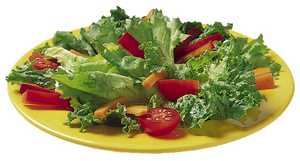Salads don’t have to be boring “rabbit food.” As with so many life experiences, what you get out of it depends on a large degree on what you put into it. Here are some salad toppings that will add an abundance of flavor and show your guests just what you bring to the table:
Nuts, seeds (pistachios, sliced almonds, shelled sunflower seeds, flax seeds): Not only do these add a flavorful crunch, but according to the Harvard Men’s Health Watch, incorporating them into a balanced diet can lower cholesterol and reduce your risk of cardiovascular disease.
Sliced boiled egg: The white of an egg is rich in high-quality protein that is low in calories and cholesterol. The yolk is home to vitamins A, B12, D, E and other valuable nutrients.
Fruit, fresh or dried: A touch of sweetness is always nice, particularly when it’s accompanied by a plethora of antioxidants, minerals, and vitamins. A handful of raisins or dried cranberries. A cubed pineapple or sliced apple. A half cup of blueberries or raspberries. Calcium, phosphorus, magnesium, and potassium are all represented here, as well as pantothenic acid, and vitamins A, B1, B2, B3, and B6. It should be noted that dried fruits tend to have more calories and sugar than the fresh stuff, but the benefits of eating dried fruit outweigh those of eating no fruit at all.
Artichoke heart: At only 25 calories, artichoke is a great contributor to a healthy diet. Besides being a good source of folate and vitamin C, it also contains and ranks number one among vegetables for antioxidant content. According to Artichokes.org, artichokes have also been reputed to help in the cure of liver diseases and liver cancer (perhaps due to its high levels of phytonutrients like Cynarin and Silymarin, know to have beneficial effects on the liver) and even as a remedy for hangovers.
Hearts of palm: Harvested from wild palm trees, this low-cholesterol, low-sodium food is rich in protein, zinc, and manganese, as well as dietary fiber. Sliced raw and added to salads, it is a refreshing way to liven up a meal.
Wheat germ: A real nutrient bonanza here. Wheat germ is an excellent source of niacin, phosphorus, thiamin, magnesium, potassium, riboflavin, iron, vitamin E, folate and zinc. It also contains fiber, protein, and a bit of fat.
Hummus: High in iron and vitamin C and low in sugar, this one is most beneficial when homemade. Being cholesterol-free and delicious are added benefits.
Fish, grilled or baked: A serving the approximate size of a deck of playing cards make an attractive and filling addition to any salad.
Firm tofu, cubed: Rich in high-quality protein, B vitamins, and iron, topping your salad with a few cubes of this absorbent food can have tremendous nutritional benefit. Although many complain that tofu is bland, it doesn’t have to be. For an added flavor kick, marinate it in a bit of soy sauce or chili sauce before adding it to your salad.
Bell peppers, grilled: Vitamins C and A are present in abundance here, along with folate acid. The red variety is known to contain lycopene, a precious carotenoid believed to reduce risk for cancers of the prostate, bladder, and cervix.
Nori (seaweed): Mineral-rich and distinct in flavor, nori is an excellent source of amino acids.
Edamame (Boiled soybeans): High in iron, this tasty legume is an easy way to increase your intake of fiber, protein, and Vitamin C. A complete list of its nutritional benefits is available at MedicineNet.com.
